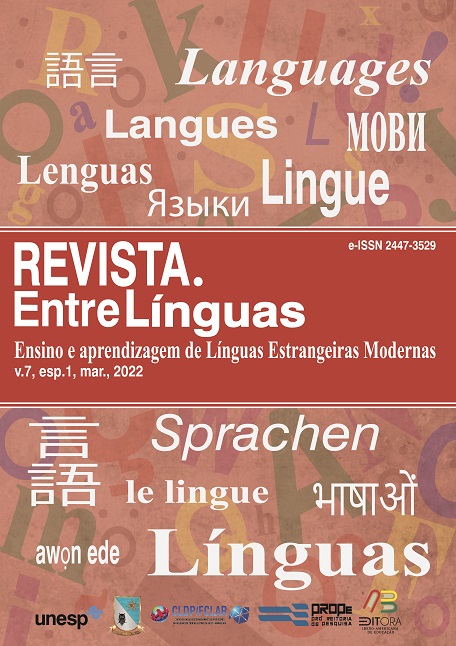Aspects of translating scientific and technical texts from english into russian for specialists with technical education
DOI :
https://doi.org/10.29051/el.v8iesp.1.16933Mots-clés :
Terminological saturation, Word-Formation model, Uncomplicated attributive constructions, AbbreviationRésumé
This article analyzes various difficulties that are usually encountered by specialists with technical education when translating scientific and technical texts. And although the purpose of any translation is to convey the content of any text as accurately as possible, nevertheless, one should not forget about the peculiarities of translating scientific and technical texts. In most English scientific and technical texts there is a huge number of technical terms, and much more than in European languages. Therefore, when translating such kind of texts, it is necessary to take into account their specifics and, accordingly, competently select the means for the most accurate translation of the content of such texts, while preserving its lexical, grammatical and substantive aspects.
Téléchargements
Références
ANIKEEVA, I. G. Formation of readiness of students of the Faculty of Foreign Languages for translation activities. 2006. Thesis (Candidate of Pedagogical Sciences) – Samara University, Russia, 2006. Available in: http://repo.ssau.ru/handle/Avtoreferaty/Formirovanie-gotovnosti-studentov-fakulteta-inostrannyh-yazykov-k-perevodcheskoi-deyatelnosti-Elektronnyi-resurs-avtoreferat-kand-ped-nauk-130008-zashishena-220606-66777?mode=full. Access in: 12 Feb. 2021.
CHERNOVETS, I. E. The main trends of term formation in the English language. Minsk: BSU, 2018.
KONYAEVA, L. A. On some difficulties of scientific and technical translation. Translation and Comparative Linguistics, n. 11, p. 50-54, 2015. Available in: https://cyberleninka.ru/article/n/o-nekotoryh-trudnostyah-nauchno-tehnicheskogo-perevoda/viewer. Access in: 27 June 2021.
KOROTKINA, I. V. Teaching academic English with the help of word formation. Higher education in Russia, v. 28, n. 2, p. 94-103, 2019. Available in: https://elibrary.ru/item.asp?id=37026035. Acceso in: 25 June 2021.
MIKHEEVA, S. V. Features of the translation of professionalism on the example of the works of Arthur Haley. Kazan: Young scientist, 2018.
SALIEVA, S. M. On the question of the types of active word formation in modern English. Tashkent: Uzbek State University of World Languages, 2019.
SHEVCHUK, V. N. Derived military terms in the English language: Affixal word production. Moscow: Voenizdat, 1983.
SUDOVTSEV, V. A. Scientific and technical information and translation. Moscow: Higher School, 1989.
TATARINOV, V. A. Theory of Terminology. Moscow: Moscow Lyceum, 1996.
USHAKOVA, A. O. Specifics of technical translation. Bulletin of PNRPU Problems of Linguistics and Pedagogy, n. 4, p. 18-26, 2017. Available in: https://cyberleninka.ru/article/n/spetsifika-tehnicheskogo-perevoda/viewer. Access in: 16 June 2021.
YABLOKOVA, M. V. Conversion as an active way of word formation in modern English. Yaroslavl Pedagogical Bulletin, v. 1, n. 1, p. 197-201, 2012. Available in: http://vestnik.yspu.org/releases/2012_1g/44.pdf. Access in: 05 July 2021.
YUDINA, I. I. Structural features of attributive phrases and ways of their translation. Moscow: Publishing house Nauka, 1981.
YUSUPOVA, SH. B. Some difficulties in translating English technical terms. Young scientist, v. 4, n. 84, p. 808-811, 2015. Available in: https://moluch.ru/archive/84/15431/. Access in: 23 Aug. 2021.
Téléchargements
Publiée
Comment citer
Numéro
Rubrique
Licence

Ce travail est disponible sous licence Creative Commons Attribution - Pas d’Utilisation Commerciale - Partage dans les Mêmes Conditions 4.0 International.
Os manuscritos aceitos e publicados são de propriedade da Revista EntreLínguas. Os artigos publicados e as referências citadas na Revista EntreLínguas são de inteira responsabilidade de seus autores.
Transferência de direitos autorais – autorização para publicação
Caso o artigo submetido seja aprovado para publicação, já fica acordado que o(s) autor(es) autoriza(m) a UNESP a reproduzi-lo e publicá-lo na EntreLínguas, entendendo-se os termos “reprodução” e “publicação” conforme definição respectivamente dos incisos VI e I do artigo 5° da Lei 9610/98. O artigo poderá ser acessado pela rede mundial de computadores (Internet), sendo permitidas, a título gratuito, a consulta e a reprodução de exemplar do artigo para uso próprio de quem a consulta, desde que haja a citação ao texto consultado. Essa autorização de publicação 328 EntreLínguas, Araraquara, v. 1, n .2, p. 323-328, jul./dez. 2015 não tem limitação de tempo, ficando a UNESP responsável pela manutenção da identificação do(s) autor(es) do artigo. Os artigos publicados e as referências citadas na Revista EntreLínguas são de inteira responsabilidade de seus autores.











